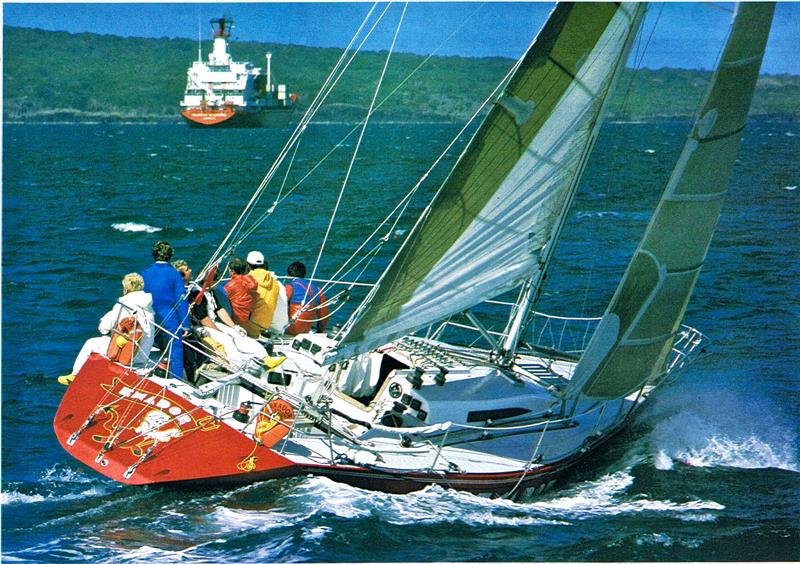
Mike Clark dies - Offshore skipper/manager and Olympic Manager
by Michael Brown, Yachting New Zealand 14 Jul 2018 14:18 BST
15 July 2018

Exador in the 1985 Admirals Cup Trials with Mike Clark in the stern with the white wet weather gear © Alan Sefton - NZ Yachting
Mike Clark had a love affair with motorcars but he also had an amazing ability to foster successful sailing campaigns and not only won the Admiral's Cup but also managed the most successful New Zealand Olympic sailing team of all time. He passed away last week aged 80, after suffering a stroke.
Mike Clark's Exador was third overall at the 1985 Admiral's Cup.
"I don't remember a single time that wasn't fun with Clarky around," Grant Beck reflected. "One of his favourite sayings was that, 'we're here for a good time, not a long time."
His presence also usually brought about successful times.
Clark had a long association with the motor industry, firstly as a mechanic and then in sales, and his success as a businessman prompted him to buy Exador, a Bruce Farr-designed 40-foot One Tonner that had considerable success, under Tom McCall, on the international keelboat scene in the mid-1980s.
It was the best-performed New Zealand boat at the 1985 Admiral's Cup, helping the three boat team finish third overall - then the country's best performance in the prestigious regatta. He returned two years later as team manager when Goldcorp, Kiwi and Propaganda went on to claim the Admiral's Cup for the first and only time in New Zealand's history. (the Admirals Cup, the unofficial world championship of offshore sailing effectively came to an end in 1999, the 2001 event was cancelled and the 2003 event was won by Australia, and has not been held since.)
His obvious talents as a team manager saw him employed as sailing team manager for the 1988 Seoul Olympics, when New Zealand won gold (Bruce Kendall - boardsailing), silver (Rex Sellers and Chris Timms - Tornado) and bronze (John Cutler - Finn).
He filled the same role for the 1992 Barcelona Olympics and ushered in an unprecedented era of success. Not only did New Zealand win four medals - gold to Barbara Kendall (boardsailing), silvers for Leslie Egnot and Jan Shearer (women's 470) and Rod Davis and Don Cowie (Star) and bronze to Craig Monk (Finn) - which was equalled by the 2016 team, but four New Zealand crews also finished fourth.
"No New Zealand team had done that before or done it since," said Beck, who coached at seven Olympics, including the 1988 and 1992 Games. "A fair chunk of that was due to Clarky. He knew his limitations with the highly technical parts of yachting but he had an amazing ability to motivate sailors and everyone else around him.
"He introduced discipline to the team for the first real time but he did it with so much fun. You never felt that it was being run like a military operation."
He also never shirked from hard work. As soon as the sailors hit the water to race he would return to the team base to get it ready for their return, whether it was cleaning the base, getting the food and drinks ready or doing the dishes.
Despite the team's success, Clark couldn't be convinced to return for a third Olympics.
"He said it was like being a member of parliament," Beck said. "You do it once to do the best job you can and go back a second time because you've still got the desire to make a difference but have the experience to go with it. After that it becomes a job and you're set up for failure. A number of people tried to talk him out of it but he wouldn't change his mind.
"A lot of the culture he introduced has flowed through. I have no doubt a number of sailors who were fortunate enough to sail under his management realised how clever he was and made sure that culture continued to exist. Whenever someone mentions sporting managers I think back to him. He set the bar."
Clark continued to have an association with sailing, sitting on the board of Yachting New Zealand and continuing to support or find support for campaigns. But it was his personal touch that many will remember him for as he continued to keep in touch with and remain interested in the people he came across in the sport.
"He had a huge character," yachting commentator Peter Lester said. "He brought all the entrepreneurial skills he learned in the car industry to yachting and they seemed to complement each other."
Mike is survived by his wife, Judy, three children, seven grandchildren and five great-grand children. A private service has already been held.